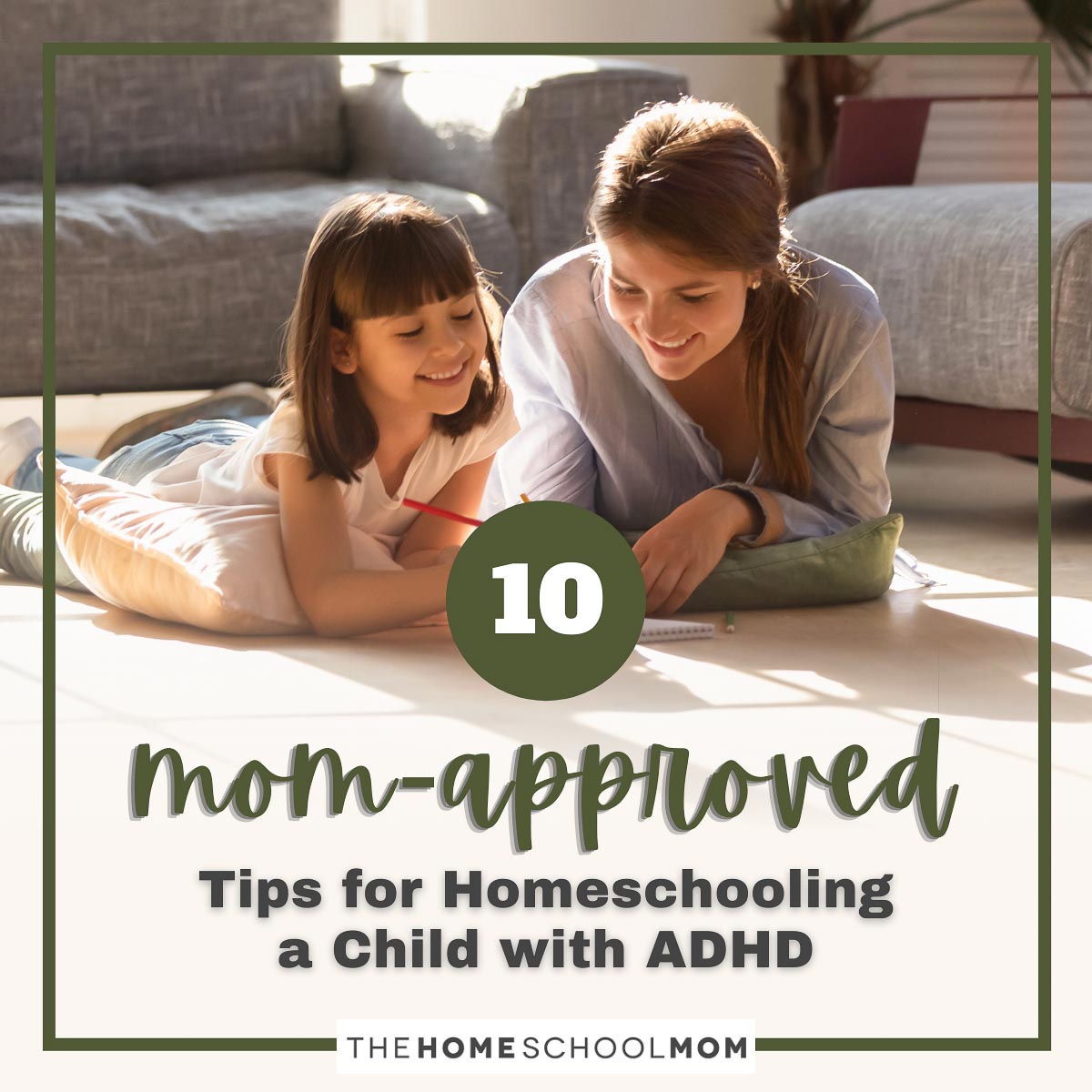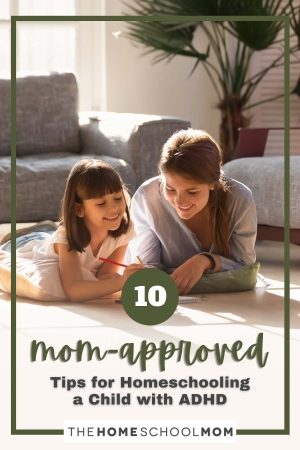My oldest son has ADHD.
What does that mean?
Well, ADHD is a diagnosis that presents differently in each child (or adult!). (This article from Child Mind Institute gives a really thorough overview.)
What it doesn't mean is that my son is incapable of learning, hyper all the time, or lazy and unmotivated.
Quite the opposite is true, in fact.
He's incredibly intelligent, super chill, and he's anything but lazy.
He's a fantastic kid with a creative mind and a huge heart.
It can feel scary to homeschool a child with an ADHD diagnosis. Their learning needs are often different from those of a neurotypical child.
The thing is...homeschooling gives you the opportunity to individualize your child's education in order to meet their specific needs.
For many families, the decision to homeschool ends up being a better choice than a one-size-fits-all public school classroom.
Below, I'm going to share 10 tips for homeschooling a child with ADHD.
Let's get started.

1. Let go of a public school mindset.
Your homeschool doesn't have to look like the public school up the road. Your child doesn't have to do schoolwork for hours on end, sit at a desk, or raise their hand to ask questions. Let go of that notion and do what works for your family.
2. Take a collaborative approach to learning.
Your child's education is just that - theirs. It makes sense to include them as you sit down to map out a plan. Figure out what their learning style is, what educational goals they have, and what you can do to make your homeschool a more enjoyable experience. If you take a collaborative approach, you'll get far less pushback because they feel heard.
3. Spend time researching how the ADHD brain works.
Those with an ADHD diagnosis are outside-the-box thinkers. Take time to research how the ADHD brain works and you'll feel more confident in your approach to homeschooling your child. Knowledge is power. Bonus: when you know more about how the ADHD brain works, you can help your child understand their own unique wiring too.
4. Get and stay organized.
Organization is key for an ADHD brain. Work together with your child to create a calm, clutter-free environment and develop routines to better manage their time. By including them in the process, you'll build their confidence and give them tools they can use for the rest of their lives.
5. Write out a checklist.
It's important for kids with ADHD to have a clear picture of what is expected of them, broken down into bite-size steps. Plus, checking things off a list offers a sense of achievement and a visual representation of the work they've completed (and what's left!). Keep it simple - a spiral notebook, dry erase board, notes app - and it will be easy to stick to every day.
6. Start your day with movement.
Let your child get their wiggles out before you start your school day. When you make movement a priority, your child will have a much easier time paying attention. A few ideas: a walk around the block, playing in the backyard, a 10-minute yoga video, a game of Twister.
7. Plan plenty of breaks.
For most kids (with or without ADHD), it's best to keep schoolwork to short blocks of time with plenty of breaks in between. Ideally, plan to spend no more than 15-20 minutes on any given activity before taking a short break. Let your child take a short walk, step outside for some fresh air, do a few jumping jacks, drink a glass of water, eat a snack, or use the restroom - anything to break up the monotony and allow them to come back feeling refreshed.
8. Set up a snack station.
Kids have fast metabolisms and when hungry, it's hard to concentrate. Being home allows you to make sure healthy snacks are readily available and easy to access. Setting up a snack station is one way to achieve this goal. The caveat is that you need to set clear boundaries so kids know what they can eat and when. For example, sweet snacks on the top shelf are for special occasions. Or, no eating within thirty minutes of mealtime.
9. Be flexible with seating arrangements.
There's no need to make your child sit at a desk. Sit around the kitchen table, on the couch, on the floor, outside on the deck...wherever they (and you!) are comfortable. You can also let them sit on an exercise ball or buy kick bands for the bottom of their chair if they like to wiggle and move. Or, kids don't even have to SIT at all. Let them stand if they want. Some kids focus better when they can stand or pace back and forth.
10. Make adjustments to the curriculum when necessary.
If the curriculum isn't working, make adjustments. Read aloud instead of assigning your child independent reading. Let them answer questions orally if writing is too difficult. Practice math facts while jumping on the trampoline. And if it still isn't working, even with adjustments...throw it out! Pass it along to someone else who can use it or sell it on a used curriculum site - let it go and try something new!
The Takeaway
It's totally possible to homeschool a child with ADHD. In fact, it's likely they'll thrive at home, away from the pressures of trying to conform to a box they were never supposed to fit into.
Many kids with ADHD need more than the average public school system can give them.
If you have the opportunity to homeschool your child and give them an individualized education, why not give it a try?
What is your number one tip for homeschooling a child with ADHD? Share in the comment section below!




 Amy is a freelance writer and blogger who homeschools her troupe of tiny humans while pursuing her lifelong dream of becoming a published author. She is fueled by coffee and the desire to do ALL. THE. THINGS. She has the attention span of a squirrel, though somehow manages to make it through each day with everyone fed and happy (well, mostly happy! Ha!) while striving to make every tomorrow better than the last.
Amy is a freelance writer and blogger who homeschools her troupe of tiny humans while pursuing her lifelong dream of becoming a published author. She is fueled by coffee and the desire to do ALL. THE. THINGS. She has the attention span of a squirrel, though somehow manages to make it through each day with everyone fed and happy (well, mostly happy! Ha!) while striving to make every tomorrow better than the last.
This was so helpful and encouraging. Thank you. I’m probably going to pull my 8 year old to homeschool her next year. This article has given me some much needed courage.
I'm so glad you found it helpful.
This list is super helpful and makes me feel like I could do it. Thank you!
Glad the strategies feel helpful to you, LeighAnn!
Thank you so much for this article! My daughter, who has adhd, has been struggling with school since 5th grade just after covid and now again with 6th grade. She is going to a new school district for 7th grade, I am hoping she will get the help she needs to succeed in learning but if not this article gives me confidence that I can pull her out to homeschool her. It also gives me ideas for helping her while she is in school!
It is a shame that it seems teachers really have no idea what adhd is or is like for a child and for that matter even their parents. I have tried with this school but they just don't get it. There should be a mandatory class that teachers should take to recognize adhd and how to help a child not make them feel like they are stupid or bad. It is so frustrating. This article gives me hope, thank you!
Glad you found the article helpful, Tricia. I used many of these strategies with my kids, and they do make a difference!
Good luck to your daughter in her new school.
Looking forward,
Jeanne
Thank you for this! I love it. I am raising my grandson who has been diagnosed with ADHD, ASD, Level 2, and lots of other initials. I took him out of public school a year and a half ago after all the craziness. He's thriving at home. I rent an old school room in a 100 year old school building that is now our town hall. We have a group on FB, The Meeting Place, in Kenbridge VA. It is strictly for serious PLAYING. The kids that come just visit and play. Boom - socialization at its truest. It's great what kids will do when there is lots of stuff lying around. I just love this unschooling life and wish I had done this my own children. My most urgent reason for pulling my grandson out of his school was that he was beginning to believe or possibly he already believed he was a "bad" kid. Between suspensions (And he would always ask me why he was suspended), so many different people's opinions and theories of what my boy needed, wanted, was doing on purpose, and how he should be molded, we were so stressed. A year and a half later, we still have stress, but so little, and we are learning everyday. He has such wild curiosity and dreams. I'm grateful.
Believe it or not, Chris, I live in Virginia and have previously homeschooled my kids a couple of counties over. I know the old school building you are talking about! I haven't been in it or anything, but I remember seeing it on the way through. So wonderful when these historic buildings can find new life.
Sounds like you are doing such a supportive job helping your grandchild reframe his self-perception. When kids don't fit school well, there really is so much stress. When we bring them home, we can provide a supportive environment and play to their strengths. As they mature, we can give them opportunities to stretch into settings that are a little more challenging—but when they have the tools to be successful. Your grandson is happy to have someone who appreciates his "wild curiosity and dreams."
Looking forward,
Jeanne
This confirms everything I have read about ADHD and tried on my son. Very helpful article, short, to the point and not judgmental. Thank you!
Glad you found the article helpful, Marie. Thanks for stopping by, and best wishes on your homeschooling!
I am a mother of nine boys(2 whom are over 18). Three of our younger boys are showing signs of ADHD. It has been a frustrating journey for me,since I also have ADHD. So this year has been a year of trying new ways to homeschool. For us games has been a HUGE plus and the boys all love it! Reading is also been something that is been helpful,just the boys don't really like to sit still for to long! I am always looking for new ideas and ways to make lessons more fun,creative,etc.,for them! Being a mom of boys is so rewarding and some days exhausting as well. I really enjoyed reading this post! Thank it was so helpful and insightful!
Hi Serena,
Glad you enjoyed this post. Sounds like you are keeping your kids' needs and proclivities at the front of your mind as you homeschool, which is fantastic for your sons. As a mother of all active sons, I also homeschooled with a lot of games, movement, and creativity. You might pick up some additional tips from my article Will Homeschooling Help ADD/ADHD?
Looking forward,
Jeanne
The school experience for my ADHD child was a nightmare. My child was in tears and hated school. His teacher basically told me that he was a terrible child and I a terrible parent. I had even met with the teacher before schools started and went over strategies she could use, but she ignored all my suggestions. I am now homeschooling, and although it has had its challenges he is doing amazingly well.
Hi, I would really love to homeschool my daughter. She is a brilliant bright young child seven years old and she’s been going to school and it’s been a support school and they let her scream for a few hours and I guess she would have problems from like nine in the morning to the afternoon and it got to the point where she said she wanted to harm herself they had to do an evaluation and everything and she would never want to hurt her self. She’s a little girl she has ADHD, and I think she might have a little bit of autism and it’s been so stressful as a parent to see my child go through this in a public school. I really would love to homeschool her, but I really need some advice. It’s been a ride and this is the second school she’s been to and it’s supposed to be a support school and I couldn’t even comfort her when she was upset I don’t know the parent rights to the schools rights as a parent, but I don’t feel that is right that the school wouldn’t let me comfort my child .
Brittany,
Homeschooling is legal in every state but the laws are different depending on where you live. If you want to learn more, I encourage you to explore local and state homeschool resources for your area. Take a look at our Homeschooling Guide for Parents for lots of info to help get you started!
This does not exactly fit your situation, but there is relevant information for you in our article on Push-outs, too. Schools do have a responsibility to educate every child. It is up to you to decide whether staying on the school to provide an appropriate education is better or making the choice to homeschool is better.
I understand that you do not want your child to continue in distress for so much of the school day. She is fortunate to have a mom who is looking at the options.
Good luck.
Looking forward,
Jeanne
Can you direct me to what happens long term with homeschooling adhd kids. My number one worry would be what will the future look like for them? I am new to all this, learning a lot. Thank you for your time.
Hi Juju - As one of our contributors likes to say, there are no homeschool guarantees. But there are also no public school (or private school) guarantees. I'm not sure if the author of this post will have a chance to weigh in (and I am not the parent of a child with ADHD), but if you are meeting your child's needs and they are progressing, that is the goal. Homeschooling gives you the ability to meet the current needs of your child without letting them be overridden by worry about future needs. As you plan for the future with the flexibility of meeting current needs, your child will be in a better position to deal with the future when it arrives. As a new homeschooler, you would benefit from the support of community. Look for homeschool groups (where you will likely meet other homeschool parents of other differently-abled kids) both online and in your area. A good place to start is by clicking the Local & State link in our main navigation to find state organizations and local homeschool groups in your area. Best wishes on your homeschool journey!
Thank you so much for this article!
Homeschooling my son with adhd while I have ADD myself makes things challenging but KEEP IT FUN is one tip you definitely need for your toolbox. That and a trampoline!
Know that public and even private schools will destroy their Spirit and be unable to pull out their strengths. Homeschooling really is the best solution if you can do it. It’s sad to see happy, creative kids become depressed, anxious, teens with low self worth under institutionalized education systems. I urge parents to homeschool as I learned the hard way with 2 of my sons.
Kristi - We have a just-turned 6th-grade boy (ADHD, OCD, some anxiety and opposition) who has gotten into trouble this year and made some bad decisions. He is very bright and high-energy but desperately wants to fit in. The public school has sort of become a self-fulfilling prophecy for him. Every day his mother and I live in dread when he's at school. As far as homeschooling, what worked and what didn't?